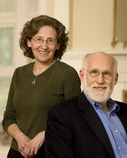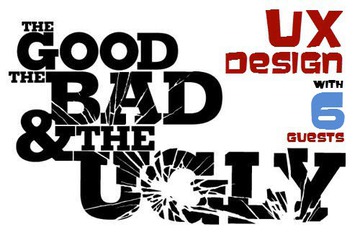|
I attended an interesting talk at UCLA by physicians and authors Jerome Groopman and wife Pamela Hartzband. It was called "When Experts Disagree: The Art of Medical Decision Making." It looks like you can watch a video of a similar talk they did at another school online. The talk is related to their book Your Medical Mind.
Pamela studied at Harvard Medical School and did her residency in endocrinology at UCLA. She is now a physician educator and author. Jerome did college and med school at Columbia, residency at Mass Gen, and fellowship at UCLA in hematology and oncology. He's now a staff writer for The New Yorker and author of 5 books. He's done extensive research on HIV and cancer and has about 400 publications. Nice. My notes and takeaways from the talk are below. Thesis: When you understand why the experts disagree, you can make better medical decisions. Conflicting expert opinions in news (looking at same research study results) Examples: Take or not take Vitamin D Mammogram check protocol Putting a number on utility Linear scale from 0-1 (0 = death, 1 = perfect health) Time trade off (how much time to give up to not have side effect) Standard gamble (estimate odds you'd take to avoid some outcome vs. chance it might kill you immediately) All 3 methods flawed cognitively Can't predict future life People adapt, med conditions not static Self-reported quality of life not objective In britain, blindness is rated 0.5 (reduces life 50%) In US, much higher (blindness not as bad) Daniel Kahneman gave address recently to med analysts Classic way of measuring utility like measuring the ether Textbooks not giving answers Sir William Osler: listen to the patient, he'll tell you the answer They interviewed many patients to come up with mindsets. 2 mindsets of people when diagnosed Maximalist: be proactive, do everything and more Minimalist: minimize medications 2 mindsets of medication orientation Naturalism orientation: prefer those extracted from herb (60% of population) Tech orientation: prefer those synthesized in lab using latest tech 2 mindsets when taking pills Believers: confident about cure Doubters: think treatment worse than disease There's a medical risk calculator online they mentioned Baseline risk of disease/bad event from your case might be really low (like 1%) vs. message pharma ad says like "med will reduce risk by 30%" (look at absolute risk and risk difference rather than relative) Cognitive traps Availability: effect of stories that stay in mind; overestimating likelihood of similar event; when you hear a story, go back to the #s Framing: 10% of side effect sounds different from 90% of no side effect; physicians just as susceptible Drug ads: for every $1000 spent, 24 new rx's written Use stories and #s #s framed in most positive way (risk reduced 30% [not 30% of 1%]) Dartmouth study found that drug ads make med seem 10X better than really is Insurance company ads contribute "Right outcome" is false hope Controversies around expert opinions Expert committee disagreements Mammograms PSA screening Their medical mindsets: Jerome Eastern European Jewish tradition Docs on pedestal Docs heroes like presidents Sci/tech honored, anything natural was throwback to village life He is maximalist, believer, and tech orientation: every med and procedure means better health Pam 1st child in family Parents were ahead of curve on exercise She is minimalist doubter The gray zone No one right answer for everyone Patient can ask what would you do; not best way to decide. Watch and wait vs. surgery yesterday End of life Advance directives: 50% of people change minds and choose differently from what wrote (because can't forecast future in circumstances that aren't experienced AND because can't predict all scenarios); experts have formulas for when medicine at end of life is futile, but they don't work in real world because can't identify those who will survive with good life quality Surrogate decision making: go back to the mindsets Medical decisions: Patient mindset: first understand this Numbers: look to see how apply to the individual Stories: Daniel Gilbert research on estimating outcome utility best done by talking to someone who had the outcome When patient knows his/her medical mind, can communicate this to their doc and better explain risk/benefit Does take time between physician and patient People aren't automobiles on assembly line; takes time Studies available online to anyone; doc's role changing from providing info to interpreting info Patients like understanding where they fit into #s Patient doesn't have to match mindset w/ doc; doc needs to know how to talk to any mindset Healthcare reform and economics have insurance companies rating docs and dinging them when patients not complying 50% of medical studies/guidelines overturned in 5 years; 23% in 1 year Step back and just acknowledge that often don't have good data instead, government panel just does sweeping regulation that isn't right Presenting relative risk is allowed but misguides Merits and costs of drug ads: Public service announcement vs. hypnotic suggestion/persuasion Can better restrict how present info Quality/outcome approaches have failed Hard to quantity Those things that matter aren't quantifiable; what's quantifiable doesn't matter EHR won't save $80B; not as much duplication of tests as claimed Adds extra costs and time waste from restricted methods of data entry Problems with metrics-based/pay-for-performance med: creates incentives to meet metrics and not patient care end goal Checklists good for surgery, procedures, infection decreases but less for medicine Insurance companies are businesses, not about saving lives or helping you get "right" outcome Healthcare costs going up because now we have more people living longer.
1 Comment
I recently attend a UX design event at UCLA, which included a presentation by Joselle Ho, Creative Director and Co-Founder of Miso Media, a music education company that got its start in mobile in 2008. It was a fun event as we got to hear Joselle's thoughts on design, and then a panel of judges critiqued some screenshots of real designs others were working on. Below are some of my notes and takeaways
Joselle UI != UX Focus on user's wants, assumptions, emotions. Design for main use case, bury functionality. Every excess click reduces engagement 90%. Replacing "Sign up" with "Learn more" increases sign-ups 350%. What you say matters. When you say it matters. Animations make a big difference (continuity and breaks). UX critiques Outside pages need to communicate 2 things: why and how. Login/Sign up/Help in upper right corner Call to action must pop out when you squint. Photo-based navigation preferred over text in studies Discovery of activity in app: make it a widget, reduce the content amount, make it like a ticker "ppl who added XYZ also added ABC"notification indicator in menu bar Tools mentioned: Blueprint for iPad Invisionapp Keynote (has hotspot/click targets) Axure Explainer video as sole thing in homepage: not great I'm excited about having graduated on Friday from UCLA Anderson. Our commencement speech was entertaining and inspirational, and I wanted to share the top 10 list that Guy Kawasaki shared with us.
Guy shares alma maters with me (Stanford followed by UCLA Anderson), so I identified with him immediately. He was the chief evangelist at Apple and author of ten books (two of which I've read and really enjoyed: Enchantment and The Art of the Start). You can watch his speech in the video above, and my notes are below. Guy's Top 10 Practical Tips for Succeeding 1. Aspire to jump to the next curve. Instead of working on a better sameness 2. Don't worry, be crappy. When you're on the next curve, it's time to ship. Ship and then test. 3. Never ask people to do something you wouldn't do. Whether it's asking customers or employees Importance of ethics 4. Obey the absolutes. There's a hard line between right and wrong. 5. Default to yes. Positive attitude Always thinking "how can I help others?" 6. Drop everything when your boss asks you to do something. Make your boss or wife look good. 7. Become a baker not an eater. For baker's, life's not a zero sum game. 8. Hire people better than you. A people hire A people. B people hire C people (and so on). Hire people better than you to prevent a "bozo explosion." (See my notes on the book Who.) 9. Change your mind. It's a sign of intelligence. Steve Jobs changed his mind all the time (and convinced you he was right before and after). 10. 10/20/30 rule of PowerPoint Optimal slides: 10 Optimal time: 20 minutes Optimal font size: 30 Figure out oldest person in room and divide age by 2 and that is the font size. 11. Suck it up Need to pay dues. Do the dirty job. 12. Have children. True success is happiness in life. Children are his greatest joy in life. Nothing came close in his life in joy. |
Archives
June 2024
Categories
All
Subscribe |


 RSS Feed
RSS Feed
